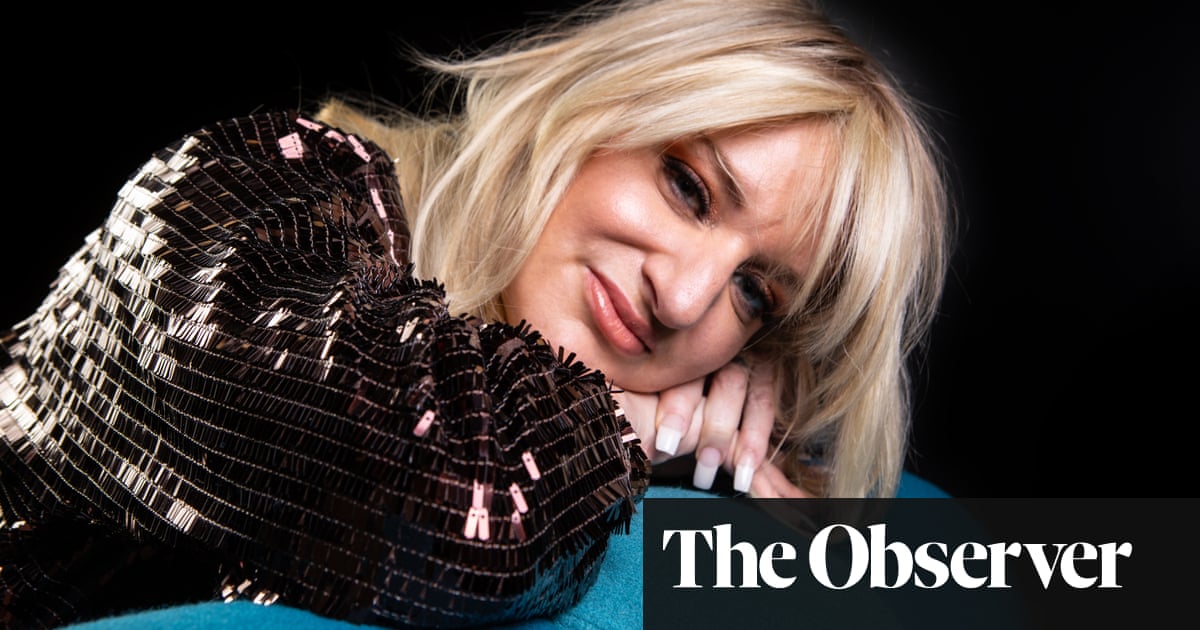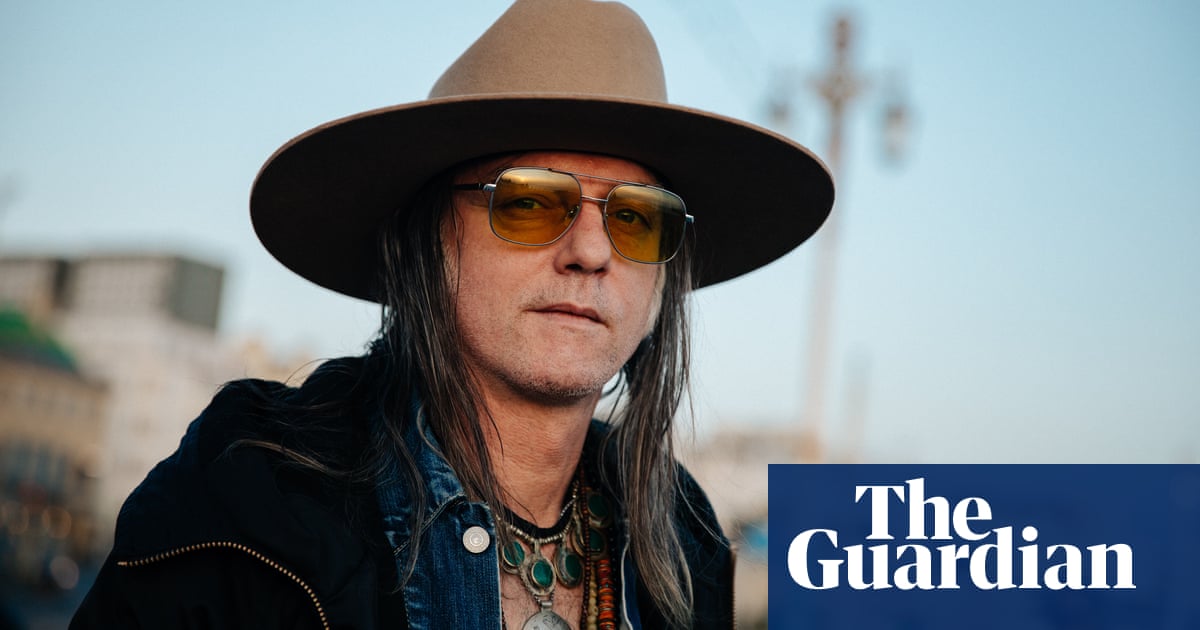
n the BBC sitcom Ghosts, two modern-day herberts, Mike and Alison, inherit a mansion populated by ancestral spirits. You’d think viewers would be outraged by the absurdity of ghosts who can pass through walls while walking on solid ground, or the implausibility of twentysomethings’ first step on the property ladder being a 14-bedroom hall, but no. Instead, in 2020, some are more perturbed by the fact that Mike is black and Alison white. “I’ve seen a lot of comments about that and even if you look at the trailer on YouTube there’s people complaining that, ‘It’s all interracial couples on television nowadays’,” says Kiell Smith-Bynoe, who plays Mike. “I understand that’s how some people feel.”
Then, over the video link from his home, Smith-Bynoe gives me a cheeky grin. “And it also makes me a bit happy. I’m like, ‘You can comment all you like on YouTube but you can’t do anything about it. It’s been commissioned – another two times.” A third series of Ghosts was commissioned before the second aired.
One of the things that made Ghosts’ first series such a hit was the relationship between Smith-Bynoe and Call the Midwife star Charlotte Ritchie as Alison. After she falls through a window and cracks her head open, Alison can see the ghosts but Mike can’t, though if he could he would probably put out the lights of the dead Romantic poet ghost who keeps putting the moves on his wife.
Smith-Bynoe is becoming, at 31, one of the most reliably funny comedy actors on TV – starring not just in Ghosts, but as Dean the estate agent in Channel 4’s Stath Lets Flats and as delectable Brummie nobody Jovell in BBC’s Man Like Mobeen. You probably also saw him with Natasia Demetriou in the ads for the BBC iPlayer’s “wasted on some” campaign, as a clueless couple who can’t understand why the BBC is broadcasting tripe such as Ghosts. “There’s 14 bedrooms with a ghost in each one,” he says. “Sorry – where’s the entertainment in that?” she asks. “Thank God we live in a new build.”
You get a sense of the fun that Smith-Bynoe is having on Ghosts from a recent Instagram post celebrating Ritchie’s birthday: “Couldn’t think of anyone I’d rather dance around a 500-year-old house with. Dead or alive.” He says: “We are very similar in our sense of humour and silliness, and they definitely saw that and realised it would work. It’s a brilliant partnership – apart from when she punched me in the face.”
Was that part of the script? “Absolutely not. There was this scene in series one where, because we’re plagued by all these ghosts, we don’t have much time to get our freak on as a married couple. She tried to wake me up in a sexy way and she punched me. That’s what it’s like with Charlotte. She punches me when she’s trying to be sexy.”
The dead are mostly played by Horrible Histories veterans, who also wrote the sitcom.
Smith-Bynoe’s aim now is to write more comedy himself. He co-wrote Enterprice, the BBC Three sitcom about two entrepreneurs and their surely doomed foot scooter-based delivery business. And during lockdown he’s been writing a pilot. But he really wants to get inside the Ghosts writers’ room. “Just one episode would be good.”
First of all, though, he wants to defend the casting of another person of colour in Ghosts. Doubts have been aired about Kitty, the young, gauche, black Georgian noblewoman played by Lolly Adefope. For Smith-Bynoe, the complaints show that many British people don’t know their own history. “It’s evidence of the lack of black history in schools that makes people think there’s no way there could be a black Georgian girl.”
The problem he thinks is that the national curriculum tends to highlight that black lives matter, but only if they’re American. “It’s a shame that so many of my peers of colour had to do their own history lessons. We’re not taught about important black figures in British history.” He cites a recent Google Doodle that introduced him to Harold Moody, the Jamaican-born physician who founded the League of Coloured Peoples in London in 1931, after lobbying for fellow persons of colour who found it hard to find lodgings or work in Britain. “He was called the UK’s Martin Luther King, and I hadn’t heard of him.”
The resurgence of Black Lives Matter this summer made him oscillate between hope and despair. “There’s a lot of work to be done but I’m sort of hopeful people are getting into the right places and that means we’ll have better representation.” But he despaired over some of his Facebook friends.
“I knew the people who are on my Instagram or Twitter have similar views to me, whereas Facebook may be people I added 10 years ago or I met them once. I thought it was more important to put out a couple of posts on Facebook so it wasn’t an echo chamber.” His posts, on the face of it, were unexceptional. Each one dealt with a black life cut short – George Floyd, Shukri Abdi, Devonte Hart. “It sparked a lot of conversations. But it also means that you are able to work out that that person you went to drama school with is a racist. I’m glad that I’ve found that out and got rid of them.”
Smith-Bynoe wanted to be an actor as soon as he made his stage debut aged four. He was the innkeeper in his primary school’s nativity play. “I had one line: ‘It’s round the back.’ So I said it and everybody in the audience laughed. I thought, ‘That was good, this applause stuff. I could pay for things with applause.’ If I was a bit cleverer I would realise that being on stage doesn’t make you any money at all.” But he was hooked, attending summer drama schools, training at East 15 drama school, before honing his comedy improv chops at Hackney Empire.
Today he is keen to stress his serious acting skills. His first professional role was in crime drama Whitechapel in 2012 as Tony Huddart, the brother of a recently murdered Londoner required to break down before the police interviewers. “In the audition I cried for real, and in the first and second take I did, too. And in the third one I was like, ‘What, again?’ I don’t think I’ve got any left.’ Luckily makeup had the tear sticks.” What are they? “They’re like Vicks but in a lipstick container and you just wipe it under your eyes and in about 20 seconds you well up.”
He watched his professional debut with his mates on his birthday in 2012. “It was 45 seconds long but I thought, ‘I’ve made it. Hollywood here I come.’ And then I didn’t work for a year.” Instead, he tried another route to stardom. In 2012, he did 40 YouTube films with mates from his area (like Idris Elba, he hails from East Ham) and quickly became a comedy name on the YouTube scene. His showreel was seen by Fonejacker creator Kayvan Novak, who made him one of his prankers on Channel 4’s spoof news show Britain Today, Tonight.
Smith-Bynoe’s career might have taken a different path had he capitalised on his success as grime MC Klayze Flaymz when he was still in sixth form. “We [Klayze Flaymz and his mates Jaxor, Terra and Ray] were doing lots of serious stuff as Red Hot Entertainment. And then one day I was going to an audition and I thought of one verse for a song about the chicken shop opposite where we used to rehearse. By the time I came out the audition, they guys had finished their verses and we had this song.”
Entitled Junior Spesh (after the £1.50 junior special Kiell favoured), the song “got 30,000 views which at the time [2007] was a big deal, and we got a little fame. But I hated it with a passion. It’s so stupid.” Well, you say that, but the one million people who have viewed it on YouTube might demur. “The original bludclart chicken connoiseurs [sic],” says one commenter. “This tune summed up that era in the mid 2000s so well. Historians in hundreds of years time will watch this video and be fascinated by the content and lyrics,” says another.
Smith-Bynoe claims to have given up grime “because I’m not as passionate about it”. That said, it’s still worth checking out a recent turn on Comedy Central in which he played Stormzy’s flatmate and fellow grime star Bosski performing a tune called Day One Mandem. Its premise is that the grime icon can’t go anywhere – doctor’s surgery, bed, shower – without being shadowed by his entourage, many of whom he doesn’t know. Hence: “Roll five deep when I go to my nan’s / In the end I had to leave there sooner / Tryna fit the whole gang in a Uber.”
“That’s all very well,” he tells me when, giggling, I recall this performance, “ but there’s more to me than laughs. I really want to do something serious. I want to play a man on a horse in a period drama.” In a puffy shirt? “Sure. Why not?” And then he cracks up at the thought of riding a horse in a puffy shirt. Kiell Smith-Bynoe can’t be serious for long.












